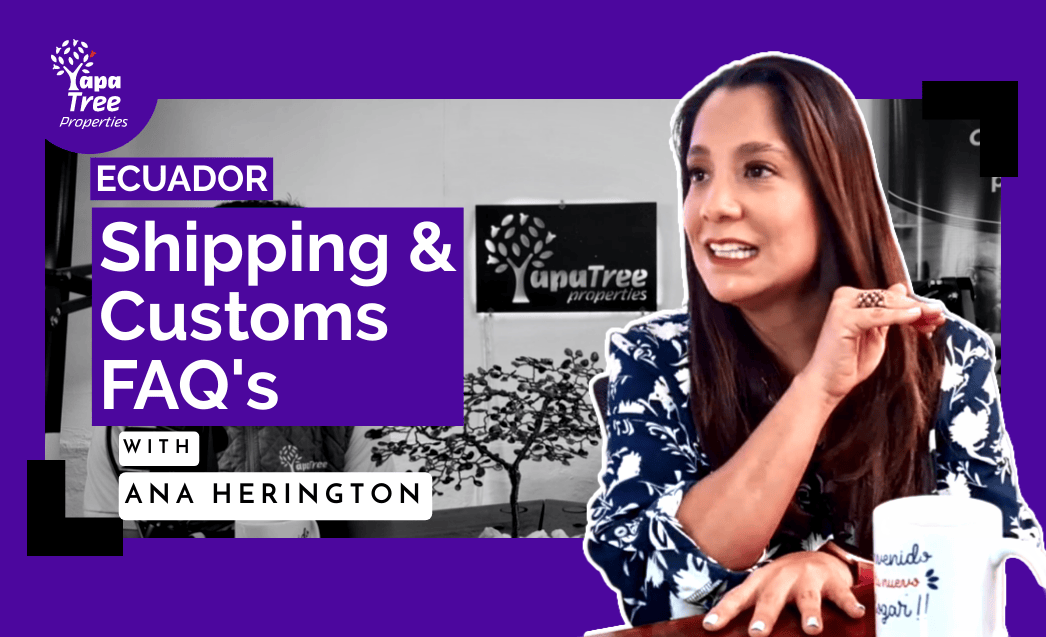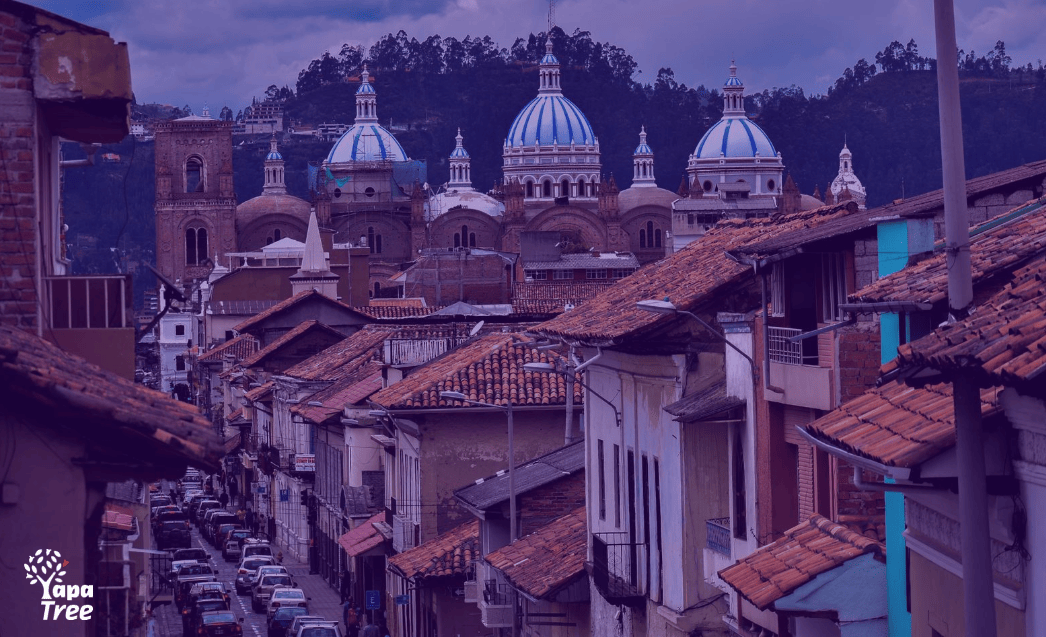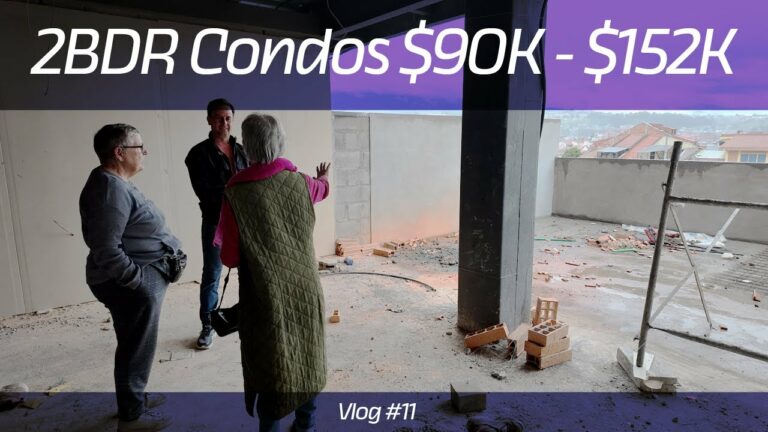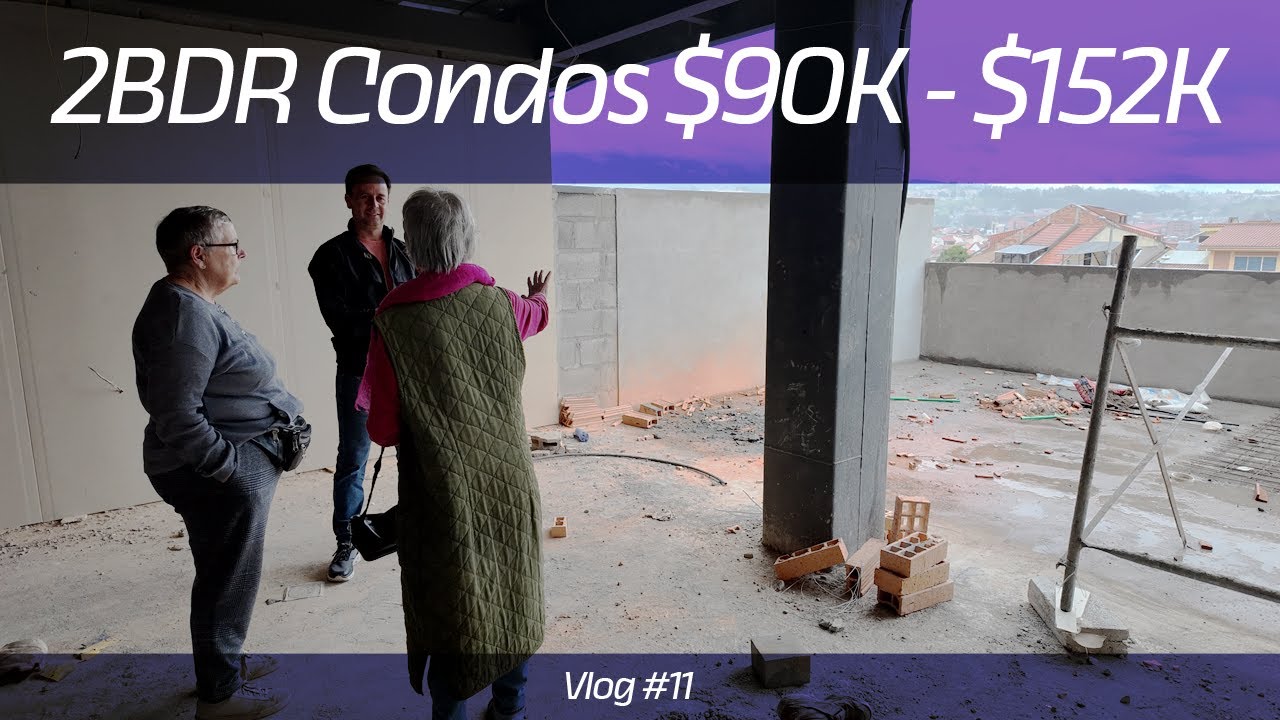Chapter Links (Timestamps)
- Intro (0:00)
- Why Ana helps expats (00:25)
- Ana as an expat (02:01)
- Customs expertise (03:35)
- Household goods & Ecuador Moves (06:14)
- Shipping basics (07:57)
- What you cannot bring (11:32)
- 4×4 limits (16:00)
- Preventing abandonment (22:06)
- Household shipment fines (26:38)
- New personal effects limits (30:54)
- Mules & risks involved (34:31)
- Common mistakes (42:54)
- Airline luggage “embargos” (43:35)
- Licensed customs agents for the win (48:03)
- Jason’s love/hate relationship with customs (49:41)
- Contact Ana (50:55)
Embarking on the adventure of relocating to Ecuador comes with its set of challenges, particularly in the realm of shipping and customs. In this interview, we delve into the intricacies of this process with Ana Herington, an attorney and certified customs agent for numerous clients, including Ecuador Moves.
This detailed conversation covered many topics. From household goods to shopping with couriers and recent law changes on what you can bring in as personal effects, Ana drops a lot of value bombs. So much so, that we consider this video essential viewing for anyone thinking about shipping or sending goods into Ecuador.
We hope you enjoy it!
Shipping Household Goods
Documentation Requirements
To initiate a household goods shipment, specific documentation is essential – particularly information of the receiver in Ecuador. Ana sheds light on the necessary paperwork, emphasizing the need for accuracy and completeness.
You’ll need detailed packing lists & guidance from an experienced shipper. Transparent and detailed documentation not only aids in the customs clearance process but also serves as a crucial record for the expat throughout their relocation journey.
The underlying message is clear: meticulous attention to paperwork is an investment in a smoother, stress-free relocation
Fees and Fines
Understanding fees and potential fines is a vital aspect of shipping household goods. Ana breaks down the most common pitfalls that can catch expats out and highlights a recent, welcome change to how Ecuador customs treats packing list issues.
Personal Effects and Air Travel
Ana urges future ex-pats to explore the aduana.gob.ec website meticulously. Here, a comprehensive list of allowed personal effects can be found. However, as of the date of writing, the list has not been updated with the latest changes. For example, a 60” TV is now allowed (before it was 32”) and vitamins/supplement allowance has doubled from 4kg to 8kg. Hopefully, Sanae will update their website soon to reflect these too.
Ana highlights the dynamic nature of these regulations, underlining the need for expats to stay abreast of the latest updates. This section serves not only as an informative guide but also as a practical tool, enabling expats to make well-informed decisions about what personal effects to bring and ensuring compliance with Ecuadorian customs regulations.
Muling and Risks
The term “muling” comes into focus as Ana explains the practice of individuals frequently traveling and acting as couriers for others. Ana takes a deep dive into the associated risks, providing a comprehensive overview of potential consequences, including the ominous risks of confiscation, fines, and legal entanglements. This section serves as a stark cautionary tale, offering a realistic portrayal of the precarious nature of muling.
Customs Monitoring Social Media
One of the lesser-known risks of muling is customs officers monitoring popular muling forums. Ana discloses that customs and government officials actively monitor social media, with a particular focus on platforms like Facebook. Ana underscores the potential consequences of such posts, highlighting the increased scrutiny and legal ramifications that may follow.
Courier Services and Exceptions
Expanding on alternative options, Ana provides a detailed exploration of using courier services like DHL, UPS, or FedEx in response to potential airline restrictions. Conditions for leveraging this option are carefully laid out, including a 20-day window for items to arrive and specific labeling as unaccompanied personal effects. Ana emphasizes the exclusivity of this exception, shedding light on an alternative shipping method that is not widely known and not officially published.
Tips for Dealing with Customs
Ana underscores the importance of consulting licensed customs agents, individuals who are immersed in the day-to-day nuances of customs laws. Caution against misinformation, especially from couriers or airlines, is reiterated, emphasizing the need for independent verification.
Overall Perspective on Customs
Acknowledging the initial complexities that may perplex expats, Ana reassures them of the importance of understanding and adhering to regulations. The emphasis on going to the source for accurate information resonates throughout, with Ana advocating for seeking help from certified customs agents who bring a wealth of expertise to the table.
The journey through Ecuadorian customs may seem intricate, but with Ana’s guidance, expats are equipped to navigate the terrain successfully, ensuring a smoother transition into their new life in Ecuador.
Even though this was a 52-minute interview, there is still a lot of detail to cover on certain topics like household goods shipping which we will cover in a follow-up video. Stay tuned!
Contact Ana
- Email: [email protected]
- Join FB Group: https://www.facebook.com/groups/Cuencaexpats/
Contact Ecuador Moves
- Email: [email protected]
Official customs website
YapaTree Properties
- Contact Jason: [email protected] or +593999475705
- Rent or Buy Cuenca Properties: https://yapatree.com/cuenca-ecuador-real-estate/
View full video transcript
Ecuador Shipping and Customs FAQs with Ana Herington [Transcript]
Jason 00:00
Hola, welcome back to the YapaTree channel, where we help current and future expats of Cuenca. Today we have a very special treat for you, a deep dive into the world of shipping with none other than the fantastic Ana Herington, an attorney specializing in Ecuador’s importing and exporting requirements. You may also know Ana as the admin of Cuenca’s largest Facebook group. I’m your host, Jason, and let’s jump right in.
Jason 00:25
All right and let’s start with the basics. You provide a lot of assistance to Cuenca’s Expat community through the administration of the Cuenca Expats and Friends Facebook group. It’s a fantastic group and I really do thank you, but it also seems like a lot of selfless effort. I know you’re extremely busy, so why do you choose to help expats so much?
Ana 00:47
Oh, well, Jason, first of all, thank you so much for having me. This is such a pleasure, such an honor that finally we’re having this nice meeting, you and me. Probably one of the most important reasons that I am doing this, it’s because I love to help people. That’s the main thing. Way back when I came here to Cuenca in 2019 with my husband, he’s from Texas, by the way. Especially for my husband, it was easy for him to try to find expats that helped him to somehow understand and know a little bit more about the Cuenca culture. We made a lot of friends at that time. I met at the time the previous administrator from the Cuenca expats, Richard Minckin, who unfortunately passed away a year ago. So we have been friends since 2019. He passed and I was already helping him to administrate the group. I gave him my word that I would keep doing this for the Cuenca Expats community and here I am.
Jason 02:01
Oh, awesome. My understanding is that you were an expat in a different country at some point?
Ana 02:07
Yeah, and also I was I was an expat. Actually, I have lived in Chile for six years. I went to law school there and I understand how expats feel in a completely different country. Even though Chile, they speak the same language. But it was a completely different culture. So you know, knowing where to go and I was a student. No family there. It was kind of like a challenge to somehow understand how that new culture works.
Jason 02:42
There are a lot of challenges that present themselves when you move to a new place. That’s our motivation or my motivation as well. I’ve lived in a bunch of different countries and invariably the person that’s helping you with that adjustment to that country for the people, makes a huge difference in just how much you’re going to enjoy the first three months, first six months in particular. So there’s a lot of effort and I do appreciate the amount of time that you put into running the Facebook group so thanks for sharing why you run that Facebook group. But from a higher level, I know that you’re basically one of the only customs and shipping gurus that I would personally go to in Ecuador. So can you just tell us a little bit about that background because I know a lot of expats kind of understand you do something when it comes to customs and shipping, but I think a lot of the details are lost.
Ana 03:35
Yeah, well I am a customs agent. My specialty is basically importations & exportations on the entire aspects. That involves importation and exportation. It can be commercial importations or it can be household goods shipments. It can be well, as a customs agent, I personally do not do couriers because that’s more like a personal process that you can do, you don’t need a customs agent for couriers. We’re talking about small shipments like the four-by-four category, but for importations, commercial importations that actually start from $5000 and more. And actually, the weight is also from 100 kilos and more is considered a commercial importation and that’s when I actually do my job, my work. So for me, it’s been probably 18 years doing this. My father, who is also a lawyer in customs, started this firm 30 years ago. And of course, once I came back from Chile, it was the normal thing for me. The passion – the only thing that I’ve ever known is this world of importations and logistics and for me, it’s fascinating. It’s fascinating because you never stop learning. Everything constantly changes, especially in Ecuadorian customs. Everything changes every day.
Jason 05:19
I have no doubt and so your day-to-day, your bread and butter is basically figuring out how to get stuff through customs. Is that it in a nutshell..?
Ana 05:28
It is more the expertise. I know all the laws, all the processes, and all the regulations that the Ecuadorian customs ask every importer to do the clearance here in Ecuador. So that’s my expertise and of course, we also work with partners. For example, my big partner friend is Vicki Spitzak from Ecuador Moves, and I have gigantic respect for her. Not only as a friend but also as a professional. She knows a lot about logistics. So that’s how we actually met. We met through the same passion that we have, that we share for shipping, for logistics.
Jason 06:14
So for household goods, that’s traditionally what Ecuador Moves specializes in?
Ana 06:20
Ecuador Moves. Her specialty is household goods shipments. All the logistics, all the shipments they have. They have their agents in the US and of course, they have their Ecuador agents here in Ecuador.
Jason 06:42
Fantastic, that’s very helpful. So if you need some household goods shipped to Ecuador, you’d go to someone like Ecuador Moves and then they would start the paperwork with the logistics but then when it comes to the actual customs clearance side of things, that’s where you in particular jump in and and and work your…
Ana 06:59
Yeah, I am. For household goods shipments, I am part of Ecuador Moves. I am the customs agent for Ecuador Moves so basically Vicki’s Basically the brain and she’s the head of Ecuador Moves and she hires me. Vicky is my friend my partner and my client and we have worked together perfectly. So yeah, if you want to go and get more information about household goods shipments, you definitely need to contact Vicki.
Jason 07:31
Sure, we’ll chuck the link in the description for anyone looking. So that’s very important that we do have a reference that we can potentially action these things with, but let’s get to some of the questions. I know that you’ve basically been bombarded with a bunch of questions, especially at this time of the year, Christmas shopping, and everyone wants their stuff and they want it now. I’m one of them, I’m waiting for some stuff and I’m a little bit nervous as to whether or not it’s going to arrive so I’m really glad that you’re here to chat today.
Jason 07:57
So the first question we have, Ana, is for someone who’s gearing up to ship a package to Ecuador, what are the key things they should know?
Ana 08:07
Wow, that’s a very, very important question to know. First of all, I will say do not, I don’t want to put it like trust but do not listen to what they tell you in origin. Let’s say for example you are in the US or you have a family in the US. Your family wants to send you a package, a gift for Christmas and they just go to, I don’t know, I don’t wanna call any companies, but let’s say they go to UFF Courier. OK, so they go to UFF (it’s an example) and say you wanna send, I don’t know, used clothes or you wanna send money with the used clothes and they will take the package. They will never say, “Well, we are not aware of the regulations in customs in Ecuador.” They will provide the service. They will take the package, but once it arrives here, that’s when you get stuck with the problems in customs. So sometimes it’s not our fault. It’s sometimes because, from origin, they’re not aware of all the regulations that we have here.
Jason 09:27
Do people normally get stumped on the types of goods or where do the issues generally arise?
Ana 09:34
There are couriers that understand some of the rules here in Ecuador. I know that some of them say, “No, we cannot ship this.” But at the same time, they don’t have the entire information or the correct information. There are some things that have exceptions that you can bring but they don’t know it. So that’s why it’s so important to go to… if you are basically… if you’re hesitating about what should I do? What can I bring? If you don’t find a customs agent, well, if you cannot contact me, it’s very easy to contact me, try to go to the main website of Aduana -aduana.gob.ec. That’s the main website where you have all the answers of all the different categories; the 4×4, the courier, what can I bring, what can I not bring.
Jason 10:29
We were looking at it before and it’s been updated recently, right? It looked like it had some good information that…
Ana 10:34
It has all the information you need. The only thing that probably you’re not going to see that has not been updated is the list of the personal effects that you can bring with you as a passenger because even for that there are also limits. It’s not that because I’m coming with my luggage, I just can bring a lot of things and a bunch of things because it’s mine. No, there are also restrictions and there’s actually a published list on the main website of the SENAE. Unfortunately, I checked the website and that list has not been updated because there have been changes since September of this year. Basically, the list of personal effects, the things that I can bring with me, has actually changed.
Jason 11:16
Let’s get to that in a little bit. I think that’s really important when we’re talking about… So there are two things, right? Shipping at the point of origin with a courier company or something like that, and then there’s the items you’re bringing on your personal effects, I think they call them. So we’re going to get to that in a little bit.
Jason 11:32
For now, let’s just say that it’s a normal package that we’re trying to send from the US into Ecuador. Is there certain information that we need to be clear about, including on the package? Like what sort of documentation are we normally looking at?
Ana 11:48
Well, there are actually the things that probably you need to know what not to what I cannot bring, but any aspect. And those things are money. You cannot ship money, even if you want to put it inside of an envelope and try to make it look like documents no, That’s a big no-no.
Jason 12:07
No amount, like even, I don’t know, a couple hundred bucks? Nothing?
Ana 12:10
Nothing, nothing. First of all these couriers, will always scan envelopes – at least I know DHL does it. We are the customs agent for DHL Express here in Ecuador by the way, so we know how the DHL process is when they receive a package. They scan everything, they open, they check, they verify and they ship it. So definitely and of course, if they see money, they will just return it at they’re they’re not going to accept it.
Ana 12:42
Jewelry. Is that correct?
Jason 12:44
Si, jewelry.
Ana 12:45
My husband always says that. I don’t say jewelry, jewelry. Anyway, sorry about that. So no jewelry. No gold, no silver. That’s a big no-no. No used clothes for any reason, no used clothes. “Oh, I want to send my hiking boots, I’m going to send it through a courier.” No, you cannot ship used clothes, no.
Jason 13:12
So it has to have a label or something to indicate that it’s brand new clothes.
Ana 13:15
It has to be new clothes, the only way to ship is through a courier. Clothes and not all the amount of clothes that I want, it has a restriction of course, which is by the category four by four, but we can talk about that in a minute, but only if it’s new clothes. So for everything, even for sending a pipe, for everything, there are restrictions and people are going to say why Ecuadoran customs are so restrictive, why they’re so…
Jason 13:44
Yeah, why?
Ana 13:45
They’re well…
Jason 13:46
It’s frustrating. I’ve had issues with customs. I’ve had quite a few issues with customs.
Ana 13:49
Well, I’ve been dealing with, sorry Senae, but we’ve been dealing as customs agents with a public institution. It’s bureaucratic unfortunately and the problem is that customs work… their main mission is to collect taxes. It’s basically that and somehow it always depends on who is running right now the entire Senae, that direction might change. I have to say that the last director from Senae that we just had recently, tried to change that direction of not only just being a collector of taxes, but also providing and facilitating people a service. So it also depends on the direction that…
Jason 14:49
Do you have any indication of where the new President is looking to go in terms of customs?
Ana 14:54
The new direction?
Jason 14:55
Yeah.
Ana 14:55
Well, I know that there’s a new director, a new lady she has been named recently and I know she will be probably by now directing the new Senae.
Jason 15:09
Sure, but it’s too early to say exactly where they wanna go.
Ana 15:13
I’m gonna meet her soon. I meet every director that it’s been for the last periods of I always go and we have meetings because it’s important to know who is the director and the direction it’s gonna take. The last director. So I saw my good friend, we had a meeting and I knew the direction that he was going to take which was like, “I don’t want to keep having this image of like just collecting taxes. I want to be a facilitator. I want to provide a service.” And in the short time that he was running, he did a pretty good job. He made actually very good changes that I’m going to tell you in a minute.
Jason 16:00
Awesome, awesome. Looking forward to hearing about those, but just moving on to some of the import categories and in particular some of the limits. The main category, or the only real category I want to focus on a tiny bit is the 4 by 4 because I personally find that category to be quite useful. But it does have its limitations and it can be quite confusing to use it, especially when you’ve got some services like Tienda Mia. They seem to operate under the 4×4 category and they’ll basically block off items if they think that it’s not going to be appropriate for the four 4×4 category but then how well do they actually know what those rules are?
Ana 16:43
Well, I’ve seen and I’ve done my little research on Tienda Mia, and I think they do a pretty good job. They’re very aware of the limits and if something is out of the limits they let you know, like, “Sorry, this is over the category 4×4, which basically for the ones that they don’t know what 4×4 is, it’s basically that you have a benefit, the Ecuadorian customs give you a benefit of bringing personal packages for your personal use that are under the weight of 4 kilos or 8.5 pounds, and the total package – and I’m talking about the total weight and the total cost of your package, cannot be more than 4 kilos and more than $400. So you need to have those two conditions to be in the category 4×4 or you can have one of those but never like 5 kilos or oh, but my package cost $100. No, definitely will not fit in the category.
Jason 17:50
Yeah and in terms of the other main exceptions, I know, oh, you tell me, does it still exist that you can only do a certain number of 4 by 4 shipments per year?
Ana 18:00
Now it’s not by how many times I can do it in a year. The limitation per year is the amount. So let’s say for example, I ship three times a year under the category four 4×4 and my total cost, the total cost of my packages in the sixteen hundred total during the year, during the entire year that’s it.
Jason 18:28
Got it.
Ana 18:29
So my restriction is I cannot ship more than sixteen hundred a year.
Jason 18:35
So maximum 4 shipments like…
Ana 18:37
Yeah, thousand six hundred dollars a year. That’s the limit.
Jason 18:41
Got it.
Ana 18:41
But here is the interesting thing, People might say, “Oh, OK, so my limit is sixteen hundred per year. Let’s say in one shipment I’m gonna ship four or five perfumes.” Then that’s like sixteen hundred dollars. You cannot do that because there is a restriction on how many items of that same item you can bring in one shipment. Yeah, because if you bring, let’s say for example, I wanna ship four pairs of shoes or 4 perfumes, if you ship more than three of those, it’s considered a commercial importation and that’s when you get stuck because this kind of things you don’t know.
Jason 19:35
No, I found that out. So we have a four-person set up here in the studio and so I tried to buy 4 microphones in the same shipment and yeah, I came across this rule and I was basically told straight up that it’s just not gonna happen. I was like okay, that makes sense cuz it’s yeah, borderline business then.
Ana 19:51
Anything that you wanna bring, even if it’s under the four 4×4. Okay, so it’s less than $400 and my weight is less than 8.5 pounds or four kilos, but I’m gonna bring five of those same items. No, no, you cannot do that. The restriction is up to three of the same item and that’s it.
Jason 20:10
Sure and with the four 4×4 four, I’ve done quite a bit of purchasing through the program myself with different providers and they all work a little bit differently, particularly when it comes to consolidation of packages. And that’s important with the 4×4 because obviously, you’ve got very defined limits. Some companies will consolidate automatically and you don’t have a choice. Others just will not consolidate anything. And so you just need to do a little bit of research in terms of that particular company and how they operate. Would you agree or do you have like a particular provider in mind that you’re happy to recommend for 4×4 or that you’re not comfortable?
Ana 20:44
Well, I personally… and again I am the customs agent for DHL and I can talk for DHL. We’ve been customs agents for them for well, my father started 25 years ago, probably more, 27 years ago and I’ve also worked for DHL before they became our clients so I worked for them for a while and I know their processes, their internal processes are pristine. They take care absolutely of every detail. They might have a little flaw here and there but they are like for me the best for shipping internationally.
Jason 21:30
Sure.
Ana 21:32
Internationally.
Jason 21:33
But do they have their own consumer-based 4×4 program though like, can I go to the DHL and just go, look, I want my stuff or do I have to go through a third party?
Ana 21:41
Yes, they do. And then they are also… well we’re talking about personal packages, personal effects, but they also have this e-commerce program that if you for example have a business where you want to export hats to the US and you want to send you know certain X amount through a courier. They have a program for E-commerce for that. I mean, it’s pretty amazing.
Jason 22:06
That’s great. I want to dig into that on another episode because exporting products like Ecuadorian products to the world I think is fantastic and not enough people do it in my opinion so let’s definitely pencil that in for a detailed chat. But in terms of the packages themselves, what happens if, let’s say a package arrives here in Ecuador, but it doesn’t have my contact information on it? Does it go to a black hole? Do I ever see it again?
Ana 22:34
One of the very first things and actually responding to one of your first questions, “What do I need to know or what do I need to have in mind before shipping?” is you need to provide all your full details when you send a package. If you’re going to send a package, you need to provide your full name or again the person who is going to receive the package here in Ecuador. So you need to provide your full name, your cedula number, or your passport number if you don’t have it, your email address, and your local Ecuadorian phone number nobody’s going to call a US number here. Once the package arrives, they will call you or they will email you. The majority of the time they email you and actually you receive an email twenty-five hours prior to the arrival of the shipment. So if they don’t see any contact information, the package is gonna stay there and nobody is gonna.
Jason 23:29
No one’s going to know it’s just gonna sit there. Yeah, right.
Ana 23:31
Nobody’s going to know and it can be any courier. It can happen with any courier. When you send these packages, you need to provide this full information, otherwise, they’re not gonna call you. So the other thing that you need to keep with you always is your tracker. Your tracking information – your tracking number. Once you give the package to the office, to the courier, they’re going to give you a little document. If you purchase on Amazon, you’re going to have tracking info. Keep that tracking info always with you, because that’s the only thing that you will have to check.
Jason 24:07
So if you lose that, you’re basically screwed, right?
Ana 24:09
That’s the only way to find and track your shipment. That’s it. If you don’t receive any information here and you know that the package is about is about to arrive, the very first thing that they’re going to ask you here in any courier, any office, give me your tracking info. What’s your tracking number? So that’s very important.
Jason 24:27
Let’s say this happened. We sent a package to Ecuador and I forgot to put my details on it. That package is just going to sit in a warehouse in Guayaquil somewhere.
Ana 24:39
Forever and ever. So yeah, yeah.
Jason 24:42
There’s no like 10-year limitation period or no?
Ana 24:45
They can stay there for a year. Usually after a year they just take them to a deposit where after a year they just destroy it or they… You have an entire year to claim your package.
Jason 24:59
Got it.
Ana 25:00
If after six months you find your package, you can actually claim it, but probably you’re gonna pay a penalty. The fine. The famous fines for not claiming your package.
Jason 25:14
But after a year. So for example, I know airports are pretty famous for having these weird auctions where you can just go and bid on a random bit of luggage that obviously belongs to someone. There’s nothing like that in terms of the goods that aren’t claimed they just get completely destroyed or burnt or whatever?
Ana 25:28
After a year they get donated or destroyed. One of those. But you have an entire year to claim those. And of course, if you go and claim that after 30 days you’re going to pay a fine, that’s the law.
Jason 25:39
Sure.
Ana 25:40
The law says that if you don’t claim your package 30 days after the arrival, you’re going to pay a fine and that penalty fee of two hundred and twenty-five dollars.
Jason 25:51
Two hundred and twenty-five. Right.
Ana 25:52
Two hundred and twenty-five dollars which is basically 50% of the main salary here.
Jason 25:58
Sure.
Ana 25:58
Next year, if the main salary increases, the fine will increase.
Jason 26:03
My understanding is they’re still trying to figure that out for next year. Do you know, have they settled on the minimum salary for 2024?
Ana 26:10
Not yet, I think they haven’t said yet. This new government hasn’t said how much it’s gonna be next salary. But be ready because the fines are gonna go up, are gonna increase and they will always increase.
Jason 26:22
Everything’s going to increase not just the fines, but, if you’re applying for a visa, for example, all those amounts are basically pegged to the minimum salary as well so it does shift everything, yeah.
Ana 26:31
Yeah, yeah, yeah. So basically, yeah, you have to be very careful with these fines. You can avoid those fines.
Jason 26:38
Awesome, awesome. I completely agree those fines are a big issue, but there are other fines too that people can be hit with it’s not just a late fee. So for example, I know some… talking about household shipments, I know that some providers make you pay a certain amount of deposit because they are expecting additional fines or additional release fees. Can you run me through that particular scenario and any I guess unexpected fees or taxes that can be sprung on people I know that happen a bit?
Ana 27:10
Usually, I know how Ecuador Moves and how Vicki works – extremely transparent, and Vicki always advises the clients. Like for example, right now, give you a very quick example: The law on household goods shipments just changed in July of this year. It changed in a way that… OK, if we see any mistakes on your list, the list that you provide because the list of your items needs to match the things that are being inspected because everything is inspected for household shipments. They’re going to open your boxes and the law says right now, “OK, if we find any mistakes”, let’s say for example, in the list says that box number one has 8 shoes and I open box number one and I see four cups of coffee. That’s a mistake on the list. And because of that, you can get a fine of $225.
Jason 28:05
So each mistake?
Ana 28:06
No, no, no, no, no. For the entire shipment, it’s one fine. For the entire shipment, even if you find one or ten, it’s one fine.
Jason 28:13
There’s always going to be some mistake there, right? There has to be.
Ana 28:16
It’s almost, it’s almost impossible… Well, with Vicky, we have actually had clean shipments that they have…
Jason 28:27
Hundred percent? 100% correct – wow that’s incredible.
Ana 28:31
But some of them, we really have to fight with customs and explain. There are some things with labels and stuff that we have to explain to the inspector, like no, this is not a, it’s…
Jason 28:43
There’s gonna be translation issues too.
Ana 28:44
Yeah, that’s actually what customs agents do behind the curtains. It’s basically, OK, this is my time here once your shipment here when the container arrives, Vicki and I we’re just behind and we’re fighting. We have to talk to the inspectors we have to let them know this is not a mistake. We have to clarify. I mean, there’s a lot of things, not just ok, here’s your container. It arrived. It’s going to be inspected, good luck. No, no, no. There’s a lot of work and fight behind for our clients for that and a lot of clarification. But the fines basically right now is that for any mistake one or ten, it’s going to be a $225 fine.
Ana 29:30
But before this new regulation that has just been published in July. Before that, when the inspector found mistakes in the shipment – they start inspecting boxes and they say, “OK so you have mistakes here in the list. Sorry, we cannot continue with this inspection. You will have to now request a pre-inspection. Which is absurd. Basically is to request a pre-inspection to correct the list and you go again and do the pre-inspection, do the corrections of the list, and then you have to do another final inspection to verify that the pre-inspection that you did was correct. That was completely absurd and I am so happy that our previous Senae director eliminated that thing again we don’t have any other second inspections or pre-inspections to correct another inspection but we have the fine. So if you realize just the movement of a container – one inspection involves like $600, 700$ for every inspection, for every movement of container, it’s a lot of money.
Jason 30:45
It certainly adds up. Now I’m glad they’ve made that change too it sounds like someone’s using a little bit of common sense, which is fantastic.
Ana 30:52
Common sense. It’s common sense exactly.
Jason 30:54
Awesome, that’s very helpful in terms of the household goods shipment Ana. But let’s move on to a slightly different theme and the personal effects and air travel. Am I just allowed to bring in whatever I want as long as it fits in my suitcase? Or how do I find out what is allowed and what is not allowed?
Ana 31:12
Well, there is actually… like I say always go to the main source which is the aduana.gob.ec main website and there is a list of personal effects that is published. The list, unfortunately, on the website has not been updated with the last regulation which was in September this year. But the items that you can bring are the same. What has changed is basically the amount of things that you can bring now, which is even more. For example, now you can bring up to 5 liters of alcohol. Before this new regulation, you were able to bring just 3. The sizes of the TV also have changed. It was like 30 inches, now it’s up to 60 inches without paying any taxes.
Jason 32:00
No, I think it was 32 inches. But yeah, 32, very, very similar.
Ana 32:03
32 and now it’s like 60. Up to 60. So you can actually find what I can bring on the main website. What I can bring, what personal effects I can bring? Basically, you can bring vitamins, you can bring your clothes, you can bring electronics, but there is also a limit on the amount of things that I can bring.
Jason 32:25
I think they doubled the supplements as well from memory.
Ana 32:27
Yeah, now you can bring up to 8 kilos of vitamins.
Jason 32:30
That’s a lot of..
Ana 32:31
That’s a lot of vitamins and supplements.
Jason 32:33
That’s really cool and this kind of moves into mulling territory, ’cause that’s kind of how they operate. And so how, let’s say, for example, the law says I can bring in a 60-inch TV. Fantastic, I get excited on Amazon, it’s Cyber Monday, I buy a 75-inch TV and now what happens? I try and bring it in through the airport, I go to customs, and customs stops me at the airport and says, “Sir, your TV is too big.” What happens?
Ana 33:06
If you bring your TV, what is actually regulated right now with you? If you want to be up to that size, you can bring it with you without any problem.
Jason 33:17
Sure, but 75 inches is bigger than 60, so it’s not allowed. So what would happen?
Ana 33:21
Well, you will pay… actually, they will tax that TV.
Jason 33:26
So they’ll tax it?
Ana 33:27
They will tax it. It’s not that they’re gonna keep it. They’re not gonna confiscate it, but they will tax it, yeah.
Jason 33:31
How would they do that? So for example, it’s a 75-inch TV. They’re just gonna find the model number, Google what I may have paid for, and then…
Ana 33:40
When you bring those kinds of items, you make sure first of all you bring your invoice with you. Make sure you have your invoice because that’s the very first thing they’re gonna ask you at the airport. And second of all, how they tax it. Well, there’s a list where the percentage of tax is based on the size of the TV. That’s why customs emphasize the sizes of the TV because the percentage of tax is based on the size. So they’re gonna go to the list, “Ok, this is like over 60” and then it says X amount of percentage, which I don’t know, I can’t remember exactly the amount, but you’re going to be, you’re going to be taxed for sure.
Jason 34:22
So they’re just going to treat it like any other similar item that someone’s going to be importing and you’re going to be paying…
Ana 34:29
They will consider it as a commercial importation.
Jason 34:31
Sure, sure. But that’s very helpful. Now moving on to the concept of mules. Now, this is a bit of a tricky one because they operate in a legal gray area basically. Can you just walk me through, in this context, we’re not talking about drugs or anything like that, we’re talking about someone in the US in particular bringing goods for people here in Ecuador. Can you just walk me through how that works and some of the pitfalls that you need to look out for?
Ana 34:58
Well, basically what Mules… here in the expat community we know mules as basically a person, a passenger that comes and goes very often back and forth and brings things for people. The amount of things that this mule brings is based on the list of the personal effects, based on the amount that I can bring. So the mule, at least a person that has been doing this for a long time they are very aware of the limits, of the weight, of the amount. So based on that they do it. What some of them might not know is that even though they’ve been… and the risk is for the person, the mule. I don’t like how that sounds but anyway, I don’t know why they put the mule, but the risk is for the mule. Sometimes they don’t realize the high risk that they run. If they get stopped at the airport, they get inspected by an officer, from a customs officer, and they will inspect all your luggage. Let’s say for example this person comes with two luggage or three luggage and they start realizing and see that some of these items are not theirs. Of course. And we all know that I have to take all the tags, and names because they receive all the packages from the US, from people, from all over. And normally what you do is you take off the tags, you take things from the boxes, and you put it in your bag because you’re bringing things like pretending it’s yours. That’s basically what they do. Which is fine, I’ve done it. I mean I’ve done it, I’ve done it a few times, but it’s very risky. It’s very, very risky. I’ve seen people and actually, I have a case, especially from a person. I’m not gonna say who the person is. It’s an expat and this person was stopped in customs I think it was like 10 or 12 bins full of things because this person was mulling and this person was doing this for years. It was never stopped at the airport. They never even thought in 100 years that they would ever be stopped and they actually thought that what they were doing was legal because they were just bringing their things.
Jason 37:37
And they’ve done it so often that they just felt invincible.
Ana 37:40
Years, but it took one time that they got stopped. Even though they were careful about not having tags and names and things like that on the things. But they saw the amount and they knew that they were mulling, that they were like an informal courier and that’s when the law goes.
Jason 37:59
And what happened?
Ana 38:01
Well, first of all, they will confiscate everything. That’s what actually happened, they confiscated everything. They will keep it and confiscate it in storage with customs. And of course, you will be able to claim some things and pay taxes for the things that you’re bringing. But some of the things based on the amount of let’s say for example vitamins, they were like hundreds and hundreds of supplements/vitamins that once you pass the amount of what the personal number of things that you can bring, it’s when they say uh so you pass the amount. But the vitamin supplements have restrictions from the health ministry so you need permission. You don’t have permission, so they will keep it you’re not going to be able to release it. So it’s very important to be aware of that, the law. I mean, for these people actually it was a nightmare. We had to intervene not only as customs agents but also as lawyers who specialize in customs. To make the story short, we were able to save the entire shipment.
Jason 39:10
Did you have to pay a big fine?
Ana 39:12
They had to pay a big fine.
Jason 39:13
Yeah, yeah, wow.
Ana 39:15
They had to pay a big fine, but they released it because they had their customers all over them.
Jason 39:20
So it is risky. That’s the bottom line. It’s a way of getting goods here and I do it. I’m waiting on a package right now, but I know that there is a good chance that if this guy gets stopped, I’m either going to lose my package or I’m going to have to effectively contribute to his fine amount and then pay some more.
Ana 39:38
Sometimes when I read comments from people saying like, “Oh, I had this before. I have brought 100 cigars with me no problem.
Jason 39:47
Of course, yeah. But one time, you got lucky.
Ana 39:50
Very lucky, let me tell you, you were very lucky but that doesn’t mean that it’s allowed or it’s going to happen to another person.
Jason 39:55
From my experience, one of the issues with the mules is once they get stopped once, then they’re a target.
Ana 40:02
They were targeted and believe me they have not been able to do this again. That was it. That was it. You definitely get targeted every time you go and you enter again too, to Ecuador.
Jason 40:17
Sure. Now I think that’s very helpful thanks for going deep on that particular topic because I know it’s one that people can get unstuck and it’s easy to trust people, and the most obvious risk before we even get to the customs risk is that it’s an unregulated industry. So you have to trust the person that’s bringing in the stuff and there are stories there too.
Ana 40:37
I understand completely why this… and again this mule service and something that probably people don’t know because again me, I go in meetings with officials. With people in customs. With directors. And I know that these people are always tracking Facebook so be very, very careful. Be very careful. I’m telling you this as your friend, as your community friend, very careful. Because I’ve seen for example posts, not from expats, but from Ecuadorians that they post on Facebook live “I’m flying in November, I’m flying in December, I’m bringing” and Senae is tracking these services.
Jason 41:26
Yeah, yeah wow. So there’s like agents in there.
Ana 41:30
Yes.
Jason 41:30
Specifically looking at catching mules now you’re saying.
Ana 41:33
I mean, yeah. A very quick example. Let me give you… I witnessed probably 6 months ago, a very good friend of mine and a very sweet girl, unfortunately. She has a pretty good business. She provides invoices, she provides facturas and everything. She has a clothing business. She brings everything from the US. She’s not a mule. She buys it in the US, but she brings it with her in her luggage. And of course, what are you doing? You’re avoiding tax, you’re not paying taxes.
Jason 42:11
You’re bringing in business stuff and you shouldn’t be doing that.
Ana 42:14
Exactly. But it’s her business so she has a store and everything and she makes Facebook lives two times a week and just one day, the SRI and customs knocked on her door posing as clients. And they were like posing as clients and she was showing and suddenly a bunch of police, I mean, it was…
Jason 42:36
Whilst doing Facebook Live?
Ana 42:37
No.
Jason 42:38
Ok, Jesus.
Ana 42:39
No, it was traumatic for her. They took everything away. At that second they had… these people have no mercy. No mercy. So be extremely careful. What you’re publishing out there.
Jason 42:54
Absolutely that’s really good advice. Facebook in general, I think you just need to be a little bit careful what we’re posting, but taking extra special precautions in this instance. Talking about the mistakes that people can make, obviously posting online, can be one, but are there any other mistakes that potential first-time shippers should be looking out for? We’ve covered a few already, I know, but are there any extra?
Ana 43:16
Well, definitely always go to the main source if you have doubts about how to ship. Don’t rely only on the information that the courier provides in origin, because they are not aware of what’s going on here.
Jason 43:30
How could they be? How are they going to know the regulations in all the countries around the world? That’s an impossible task.
Ana 43:35
Even the airlines, even the airlines provide the wrong information about passengers. And the famous embargo that so many expats talk about. Well, they want to bring luggage, especially during this time of the year and I don’t know why airlines at the airport say “No, it’s customs. This is restrictions in Ecuador.” No, this has nothing to do with Ecuador’s customs.
Jason 44:00
Just trying to save on fuel or what did you put it down to?
Ana 44:02
No, it’s basically some airlines during a certain time of the year, not necessarily during December, it can be any time during the year that they have their own high seasons and high demands. When the demand is so high they restrict passengers to what amount of luggage they can bring. Even if you want to pay extra, they don’t allow it because of the embargo. The embargo is basically a restriction from the airlines, not from the country.
Jason 44:33
But basically saying we’re full of baggage right now, therefore we can’t take anymore.
Ana 44:38
No, they don’t want to look bad they just say to the passengers, “Oh no, right now Ecuador is not allowing.” I don’t know why they say that.
Jason 44:47
I mean to make themselves look like they’re not the enemy.
Ana 44:50
The airline, they’re not going to say to you, “We don’t allow you to bring.” I don’t know if because there are contract issues, service issues they can get in problems, I don’t know. But this is definitely not an Ecuadorian customs issue.
Jason 45:05
Yeah, it’s not very transparent from the airlines. Is there any way to fight that? With the airlines, have you come across any successful scenarios?
Ana 45:16
Not directly. And this is another exception that probably very few people know. That when let’s say, for example, I have many cases of ex-pats, who are at the airport and are bringing 6 luggage. The airport says you cannot bring six because of the embargo. You can only ship two, so they got stuck with four. What they do at that moment is that they have the option to ship it through a courier: DHL, UPS, or FedEx. Do not ship through Ecuadorian post, please.
Jason 45:58
Why is that? What happens?
Ana 46:01
It’s a nightmare. Sorry, Ecuadorian post, but it’s a nightmare. I will go into that in a minute but you can ship your luggage separately through a courier. But there are conditions to do that, and the condition is that you need to fly. And you need, let’s say, for example, you’re flying through American Airlines with your two luggage and you ship four of your luggage through DHL. The luggage that you’re shipping separately needs to arrive within a time period of 20 days. Once you arrive, you have 20 days for the luggage to arrive and to claim it as personal effects. That exception is called the luggage of a passenger that is not coming with… I don’t know how to say this in English, but it’s “equipaje de pasajero”. So it’s like not… how do you say that?
Jason 47:00
It’s goods unaccompanied.
Ana 47:02
Unaccompanied, personal effects. Unaccompanied. Exactly that’s it in English. So you can do that, but there are conditions and there are also restrictions to that. And with that, that luggage, you can ship your clothes, your used clothes. It’s the only exception that allows you to bring your clothes. That exception is so exceptional that it’s not even published.
Ana 47:29
Yeah, right.
Ana 47:30
It’s not even out there. Why?
Jason 47:31
So is this a backdoor way for me to get some second-hand clothes into Ecuador with this exception or not?
Ana 47:36
The only way is that you fly with that…
Jason 47:39
I’m going to pay a lot of money through the couriers eventually, though, right? If I’m at the airport, I’m assuming they’re going to be pretty expensive, the courier options.
Ana 47:46
Yeah, yeah, yeah because they’re going to charge you based on the weight.
Jason 47:50
Si, si, si. So not a great plan for getting secondhand clothes here.
Ana 47:55
I’ve seen people paying like $8000 for luggage that’s shipped through a courier, but they don’t have any other option to do that, so.
Jason 48:03
Wow, that’s very helpful Ana. Any other last-minute tips about the customs and shipping that you have?
Ana 48:12
Well, customs is fascinating for me. I know that for a lot of people, it’s a nightmare and a lot of people just satanize Ecuadorian customs. And yes, sometimes it might seem very unfair and confusing. But the best way to somehow do this correctly is to go to the source. The main source of information, is the main website, Senae website, that I’m I’m sure you can publish later. Contact a customs agent, a customs agent. When I say that, we have our certification, we’re registered with Ecuadorian customs.
Jason 48:52
It’s very important that they know and keep up to date with the laws here. I’ve seen some pretty big horror stories happen with customs agents that maybe they’ve been applying something that doesn’t actually exist, but ultimately you as the consumer, you’re going to lose out if that happens.
Ana 49:09
So yeah, facilitators may be informed but a licensed customs agent that is on the day-by-day and on the law every day, it’s a completely different thing.
Jason 49:25
I agree.
Ana 49:25
Go to the source, go to the main website of Senae and if you have any questions, of course contact me.
Jason 49:34
I wish I knew you when I first came to Ecuador.
Ana 49:37
A lot of people say that to me. A lot. A lot of people say I wish I would’ve met you before.
Jason 49:41
I have a love-hate relationship with customs here because that’s actually the reason I’m in Ecuador. My origin story is I came to Ecuador for kitesurfing. My gear was being sent to Ecuador unaccompanied by me, and that was just such a huge mess that it took me months. And by the time I figured out that mess, I met my partner and started to like Quito and all the rest of it. So in a way, if it wasn’t for, I’m just gonna call it the inefficiency of customs, I probably wouldn’t be in Ecuador today. So in a way, this is like a bit of a silver lining from a personal point of view it’s like, OK, it’s not all bad with customs. Sometimes unintended consequences work out to be OK in our circumstances.
Jason 50:25
So Ana, thanks very much for your time today. That was I think a very comprehensive guide to shipping and customs in Ecuador. And so if you do have any questions for Ana or Ecuador Moves, how do they want to contact you or and/or Ecuador moves?
Ana 50:44
Oh well, you can contact me through the Cuenca Expats and Friends group which by the way, I am more than happy to provide information for our community through my email. I can leave you my email: [email protected] or my WhatsApp. I’m very available too. Also for household goods shipments, don’t forget Vicki Spitzack of Ecuador Moves.
Jason 51:13
Probably do an episode just on household shipments because it’s got a bunch of rules associated with that, so, at some point, we’ll focus on that.
Ana 51:21
That’s a completely different world. That’s an alternative universe for shipments. So definitely, yeah, definitely it’s something that we will need to cover with… I would like to have Vicki here, of course, because she’s amazing.
Jason 51:36
Fantastic. Thanks, Ana and if you’ve found this information helpful, please don’t forget to like and subscribe. And of course, if you’re in the market to rent or buy property, feel free to check out our listings at yapatree.com or feel free to provide your preferences to us and we’ll do the searching for you.
Jason 51:52
So thank you very much for watching and we’ll catch you in the next video. Take care.




















4 Responses
Exceptional article! Thank you so much Jason and Ana!!! What a wealth of information at the perfect time for us. We have just started our visa process while here in Cuenca. We plan to move here full time in April 2024!
Thanks Sue! Great to see you’re getting value from the article and video.
As a Cuenca newcomer, feel free to let us know if there are any topics you’d like to see more information on (doesn’t need to be related to shipping).
I have a question. I ordered sugar-free BBQ sauce and sugar-free syrups from Tiendamia about 2 months ago. When I went to place a reorder, the pages are showing these items are not allowed to be imported into your country.
What happened? What are the options since these are not available here?
Thank you for reaching out. Ryan already made contact with me and his inquiry has been answered